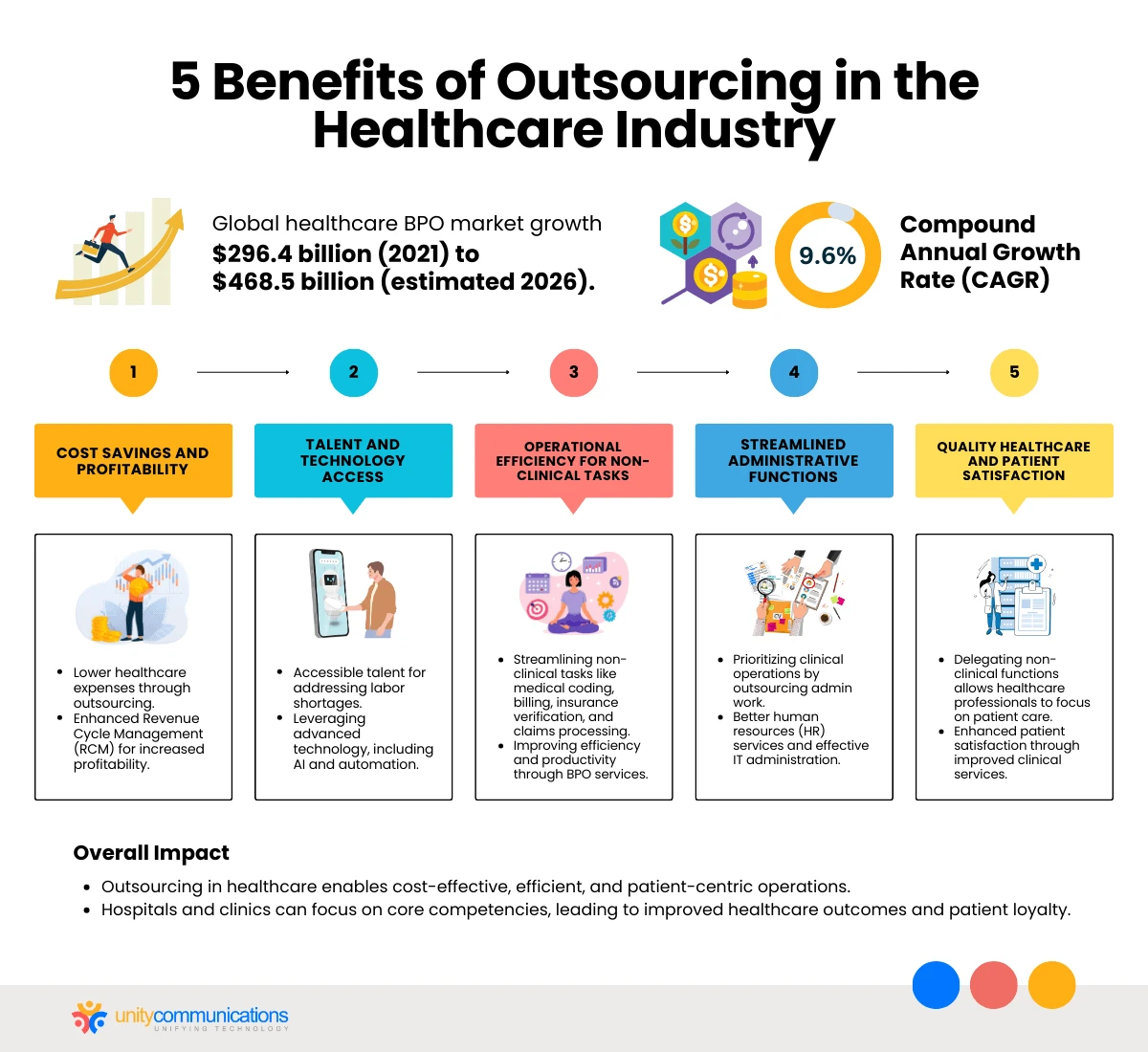IN THIS ARTICLE
Table of Contents
Healthcare providers primarily serve to diagnose and treat patients. They save lives and promote public health. However, a lot of processes are running behind the scenes.
Enter healthcare business process outsourcing (BPO). This industry is a viable solution to allow healthcare providers to optimize back-end functions while focusing on their core operations—delivering quality healthcare.
This page covers the benefits of outsourcing in the healthcare industry. Read on to learn how to overcome the strategy’s challenges as well.
The Rise of the Healthcare BPO Industry
To start, what is BPO? BPO is the practice of outsourcing processes to third-party service providers instead of handling them in-house.
The BPO sector has exploded in popularity, having penetrated various industries. Big corporations establish their call center operations in the Philippines. Tech giants outsource information technology (IT) functions and software development to India. E-commerce businesses outsource customer service, while banks delegate billing and collection tasks to BPO providers.
The healthcare industry is no exception. Initially, health organizations were hesitant to outsource clinical operations due to the sensitive nature of their work—diagnosing and treating patients. However, the pandemic paved the way for the rise of healthcare outsourcing.
Back-end functions such as admin work and patient support services are critical to healthcare operations. Since some healthcare facilities lack the necessary staff, technology, and resources to efficiently accomplish these tasks, they turn to outsourcing companies for help.
Additionally, healthcare organizations have recently begun outsourcing clinical operations such as direct patient care, virtual medical care, and remote patient monitoring (RPM). For example, clinics outsource their diagnostic work (laboratory exams and imaging services) to other providers to access expertise, technology, and resources.
Learn more about the benefits of healthcare BPO in the next section.
Five Key Benefits of Outsourcing in the Healthcare Industry

The healthcare BPO sector shows no signs of stopping or slowing down. Its global outsourcing market could grow from $296.4 billion in 2021 to $468.5 billion by 2026, expanding at a compound annual growth rate (CAGR) of 9.6%.
Clinics, hospitals, insurance carriers, and other healthcare organizations continue to leverage healthcare outsourcing. Here are a few reasons why:
1. Lower Costs but Higher Profits
Cost savings are one of the benefits of outsourcing in the healthcare industry. Not only does it reduce expenses, but it also helps boost your bottom line. Healthcare BPO is best for maintaining your cash flow as it offers the following:
- Reduced healthcare expenses. Working with an offshore provider can reduce labor and operating expenses. You need not worry about hiring talent with medical backgrounds, investing in healthcare software and tools, or building infrastructure. Outsourcing can help you save money in the long term.
- Enhanced revenue cycle management (RCM). A reliable healthcare BPO provider can stay on top of your revenue cycle. It can track and analyze the money you receive from patients for the medical services rendered. The goal is to ensure your organization generates more revenue than it spends.
2. Accessible Talent and Advanced Technology
Accessibility is one of the benefits of outsourcing in the healthcare industry. Clinics and hospitals lacking resources can turn to BPO service providers for the following concerns:
- Addressing labor shortage. You likely need people to work on various healthcare functions, such as medical billing and claims processing. You can hire a BPO service provider to handle these non-core tasks when confronted with limited staff.
- Leveraging technological resources. You might need the latest digital tools and communications technology for virtual healthcare and RPM. Or you might need automation and artificial intelligence (AI) for repetitive healthcare tasks, such as data entry and analysis. In these situations, healthcare BPO is the answer!
3. Increased Operational Efficiency of Non-clinical Tasks
The benefits of outsourcing in the healthcare industry mainly apply to non-clinical tasks. Reputable BPO service providers help streamline operations for overall efficiency and productivity. Below are the healthcare functions they can handle:
- Medical coding and billing. Healthcare BPO agents use the Healthcare Common Procedure Coding System (HCPCS), International Classification of Diseases (ICD), and Current Procedural Terminology (CPT) codes to categorize medical diagnoses and procedures. From there, they generate superbills sent to insurance providers and patients.
- Insurance verification and claims processing. Healthcare BPO agents verify insurance eligibility and medical coverage. They also review and adjudicate claims that healthcare providers or insurance members submit.
4. Streamlined Administrative Functions
Prioritizing clinical operations is one of the primary benefits of outsourcing in the healthcare industry. Clinics and hospitals can focus on diagnosing and treating patients while their hired BPO partners handle admin work. Consider the following:
- Better human resources (HR) services. You can entrust recruitment, training, and employee management to a third-party service provider. Doing so allows your team of doctors to focus on performing medical examinations and treatments.
- Effective IT administration. IT administration is the most outsourced admin work. You can delegate IT functions, such as troubleshooting, hardware and software maintenance, and network management, to an expert BPO provider. Outsourcing guarantees undisrupted healthcare operations.
5. Quality Healthcare and Enhanced Patient Satisfaction
The benefits of outsourcing in the healthcare industry boil down to delivering quality care and achieving patient satisfaction. You can achieve both objectives by working with a reliable BPO service provider. Here is how:
- Improving patient care. Entrusting non-clinical functions and admin tasks allows doctors and other health professionals to focus on patient care. They can deliver better healthcare services to patients without worrying about medical billing, claim filing, IT support, or RCM.
- Ensuring patient satisfaction. Doctors can provide excellent healthcare by delegating non-clinical functions and focusing on clinical services. Doing so translates to increased patient satisfaction and guaranteed loyalty. Patients will continue to get medical services in your clinic, whether routine checkups, diagnostic services, or medical procedures.
How to Overcome Challenges in Healthcare Outsourcing

There is no denying the benefits of outsourcing in the healthcare industry. Healthcare BPO allows clinics and hospitals to optimize their back-end operations and prioritize delivering quality healthcare.
But while healthcare outsourcing proves beneficial in many ways, it also has its fair share of possible drawbacks. Overcoming common BPO challenges and reducing its potential risk are crucial. Here is how:
- Uphold protected health information (PHI). The HIPAA Journal reported about 347 healthcare data breaches involving over 500 records in 2022. When outsourcing, protect patient data by complying with the Health Insurance Portability and Accountability Act of 1996 (HIPAA). To avoid data breaches when outsourcing, provide proper training and hold everyone accountable.
- Invest in technology and resources. Leverage robotic process automation (RPA), AI, and the cloud for non-clinical operations, such as medical billing and claims processing. Use digital tools and communications technologies for clinical functions such as direct patient care, virtual healthcare, and RPM.
- Develop a comprehensive contract. The service-level agreement (SLA) is legally binding and covers your project terms in detail. Include the key performance indicators (KPIs) your healthcare BPO provider must meet and define the work scope clearly. The SLA reduces the outsourcing challenges and minimizes the risk.
- Hire the right healthcare BPO provider. Your outsourcing success boils down to working with the right partner. Consider a BPO provider with a team of healthcare professionals. Factor in its technology and resources, outsourcing cost and pricing model, track record, and business reputation.
The Bottom Line
The benefits of outsourcing in the healthcare industry encompass improved patient care and operational efficiency. Healthcare BPO can bring so much to the table, from decreasing costs and increasing profits to ensuring patient satisfaction and quality care.
If you want to take advantage of all these benefits, start looking for a reputable healthcare BPO provider. More importantly, follow our practical tips for overcoming the above outsourcing challenges. With these, you can capitalize on the wonders of healthcare BPO.
Looking to venture into healthcare outsourcing? Unity Communications is the answer. We can help your health organization optimize its back-end operations so that you can deliver quality patient care. Let’s connect to get started today!





